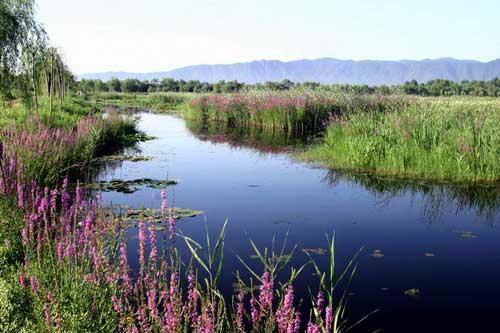Beijing's wetland faces serious degradation
2010-02-08 14:51 BJT
It has been learned from the Beijing Municipal Bureau of Landscape and Forestry working conference that Beijing’s wetland areas, only about 51,400 hectares, are declining drastically, and the city faces a severe threat of environmental degradation.
|
|
|
Beijing's wetland faces serious degradation |
Industry insiders believe that rapid urban development in Beijing has taken over old wetlands, and a large number of the original reed ponds and swamps in the suburbs have disappeared so now only about 864 hectares remain. In the past, springs and areas of shallow water were everywhere around the Liulangzhuang and Bagou areas of Haidian district and now these areas are all built up with skyscrapers and other buildings, and the wetlands have disappeared. The vast Sanhaizi used to be a well-known wetland of Southern Beijing, and now buildings have surrounded this wetland area, and its size has been greatly reduced.
According to relevant statistics, in 1962 the area of reed ponds in the suburbs of Beijing was 1 million hectares, and 40 years later that number is down to less than 500 hectares. Over the 28 years from 1980 to 2008, Beijing's paddy field areas have been reduced by 95.8 percent.
According to experts from the Beijing Municipal Bureau of Landscape and Forestry, the wetland resources of Beijing are excessively used, and the wetlands face more and more pressure from tourism. Aside from the 2 reservoirs in Miyun and Huairou, which are off-limits to visitors, the dams of other major lakes and rivers have almost all, to varying degrees, been developed as tourist destinations. Travelling and other human activities have a great impact on the wetlands, and particularly on migratory birds, whose habitat is seriously disturbed, and furthermore, this type of activity also does great damage to the biodiversity and numerous other aspects of the wetland areas.
The experts also revealed that the rapid development of industrial and agricultural production has brought about a large number of pollutants in Beijing, the spread of which has also led to the destruction of wetland functions, for example there have been drastic decreases to the originally high number of amphibians, such as green pond frogs, which have almost disappeared.
Serious wetland pollution, accumulation of sediments, and the gradual decline of the wetland's ecological functions are also reasons for the degradation of the wetlands. According to the water quality monitoring done by the Beijing Municipal Bureau of Environmental Protection in the rivers, reservoirs and elsewhere, water quality worse than Grade V still accounts for 41 percent of the water in the wetlands.
Experts urge that the first step towards protecting the wetlands is to save the areas that remain, and prevent them from being encroached upon, destroyed, and polluted; to undertake restorative construction on degraded wetlands, doing all that is necessary to allow the ecosystems of Beijing's wetlands to flourish; to promote the construction of a Wetland Park as soon as possible and to comprehensively and effectively manage the existing wetlands; and to promote wetland legislation and to put protecting the wetlands into law.
Editor: Shi Taoyang | Source: CCTV.com
 Mail
Mail Share
Share Print
Print



 Video
Video









 2009 China Central Television. All Rights Reserved
2009 China Central Television. All Rights Reserved